
A ticket machine, also known as a ticket vending machine (TVM), is a vending machine that produces paper or electronic tickets, or recharges a stored-value card or smart card or the user's mobile wallet, typically on a smartphone. For instance, ticket machines dispense train tickets at railway stations, transit tickets at metro stations and tram tickets at some tram stops and in some trams. Token machines may dispense the ticket in the form of a token which has the same function as a paper or electronic ticket. The typical transaction consists of a user using the display interface to select the type and quantity of tickets and then choosing a payment method of either cash, credit/debit card or smartcard. The ticket(s) are then printed on paper and dispensed to the user, or loaded onto the user's smartcard or smartphone.

The Pioneer Valley Transit Authority (PVTA) oversees and coordinates public transportation in the Pioneer Valley of Western Massachusetts, offering fixed-route bus service, paratransit service, and senior van service. PVTA was created by Chapter 161B of the Massachusetts General Laws in 1974. Based in Springfield, Massachusetts, PVTA serves Hampden and Hampshire counties, and provides connecting service to CTtransit in Hartford County, Connecticut, to FRTA in Franklin County, and to WRTA in Worcester County. It is the largest regional transit authority, and second largest public transit system in Massachusetts after the Massachusetts Bay Transit Authority, providing service to over 11 million riders annually across 24 municipalities in the region, with about 70% of all riders using the system as their primary mode of transit.
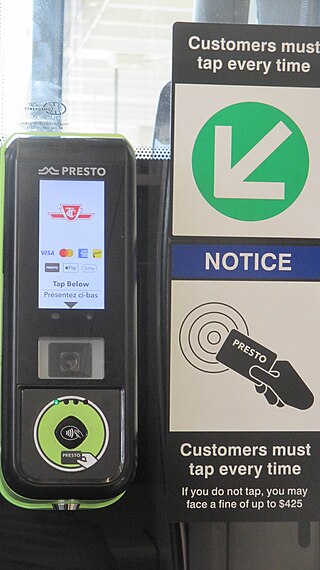
Fares to use the Toronto Transit Commission (TTC) transit system in Toronto, Ontario, Canada, can be paid with various media. The price of fares varies according to age, occupation, income level, and health condition of riders.
The farebox recovery ratio of a passenger transportation system is the fraction of operating expenses which are met by the fares paid by passengers. It is computed by dividing the system's total fare revenue by its total operating expenses.
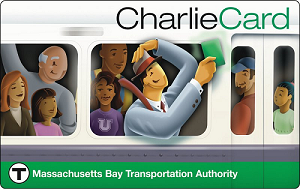
The CharlieCard is a contactless smart card used for fare payment for transportation in the Boston area. It is the primary payment method for the Massachusetts Bay Transportation Authority (MBTA) and several regional public transport systems in the U.S. state of Massachusetts. It is used on the MBTA's subway and bus services, but is not currently accepted on the MBTA Commuter Rail and ferries.

Pittsburgh Regional Transit is the second-largest public transit agency in Pennsylvania and the 20th-largest in the United States. The state-funded agency is based in Pittsburgh and is overseen by a CEO and a board of unpaid volunteer directors, some of whom are appointed by the county executive and approved by the county council; and one each by the majority and minority leaders by each political party. After operating as the Port Authority of Allegheny County for most of its history, the agency rebranded under its current name in June 2022. In 2023, the system had a ridership of 39,730,300.

Proof-of-payment(POP) or proof-of-fare(POF) is an honor-based fare collection system used on many public transportation systems. Instead of checking each passenger as they enter a fare control zone, passengers are required to carry a paper ticket, transit pass, transit smartcard - or open payment methods such as contactless credit or debit cards (if applicable) - after swiping or tapping on smart card readers, to prove that they have paid the valid fare. Fares are enforced via random spot-checks by inspectors such as conductors or enforcement officers, to ensure that passengers have paid their fares and are not committing fare evasion. On many systems, a passenger can purchase a single-use ticket or multi-use pass at any time in advance, but must insert the ticket or pass into a validation machine immediately before use. Validation machines in stations or on board vehicles time stamp the ticket. The ticket is then valid for some period of time after the stamped time.

The Compass Card was the first-generation smart card used for automated fare collection on public transport services within San Diego County, California. Administered by the San Diego Association of Governments (SANDAG), it was valid on a number of different travel systems in San Diego County including MTS buses, the San Diego Trolley, North County Buses, the Coaster and the Sprinter. The system was operated by Cubic Transportation Systems. Phased out over the third quarter of 2021, it was discontinued on August 31, and its successor, Pronto, launched the following day.
The Chicago Card and the Chicago Card Plus were contactless smart cards used by riders of the Chicago Transit Authority (CTA) and Pace to electronically pay for bus and train fares in the city of Chicago, Illinois, USA and the surrounding suburbs. On June 1, 2014, CTA and Pace stopped accepting these cards as part of a transition to Ventra.
A contactless smart card is a contactless credential whose dimensions are credit card size. Its embedded integrated circuits can store data and communicate with a terminal via NFC. Commonplace uses include transit tickets, bank cards and passports.

The Breeze Card is an American stored value smart card that passengers use as part of an automated fare collection system which the Metropolitan Atlanta Rapid Transit Authority (MARTA) introduced to the general public in early October 2006. The card automatically debits the cost of the passenger’s ride when placed on or near the Breeze Target at the fare gate. Transit riders are able to add value or time-based passes to the card at Breeze Vending Machines (BVM) located at all MARTA stations. The major phases of MARTA's Breeze transformation took place before July 1, 2007 when customers were still able to purchase TransCards from ridestores or their employers. They were also able to obtain paper transfers from bus drivers to access the train. As of July 1, 2007 the TransCard and the paper transfers were discontinued and patrons now use a Breeze Card or ticket to access the system, and all transfers are loaded on the card. Breeze Vending Machines (BVM) distribute regional transit provider passes The Breeze Card employs passive RFID technology currently in use in many transit systems around the world.
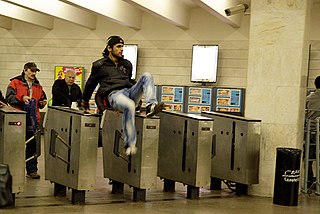
Fare evasion or fare dodging is the act of travel without payment on public transit. When considered problematic, it is mitigated by revenue protection officers and ticket barriers, staffed or automatic, are in place to ensure only those with valid tickets may access the transport. The term fare avoidance is sometimes used as a euphemistic synonym and sometimes used to refer to the lawful use of much cheaper tickets.

The Transit Access Pass (TAP) is a contactless smart card used for automated fare collection on most public transport agencies within Los Angeles County, California. The card is also available in electronic form, free of charge, in Apple Wallet, thereby bypassing the need to purchase the plastic USD $2 card. It is administered by the Los Angeles County Metropolitan Transportation Authority (Metro), and the card and fare collection systems are manufactured by Cubic Transportation Systems.
A fare is the fee paid by a passenger for use of a public transport system: rail, bus, taxi, etc. In the case of air transport, the term airfare is often used. Fare structure is the system set up to determine how much is to be paid by various passengers using a transit vehicle at any given time. A linked trip is a trip from the origin to the destination on the transit system. Even if a passenger must make several transfers during a journey, the trip is counted as one linked trip on the system.
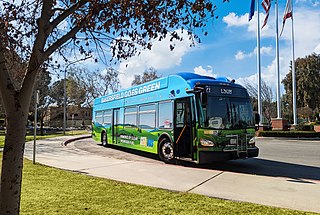
Golden Empire Transit is the operator of mass transportation in Bakersfield, California. There are 16 routes serving Greater Bakersfield, which includes both the City of Bakersfield and adjacent unincorporated communities. Since 2005, almost the entire bus fleet has been powered by compressed natural gas. In 2021, 5 hydrogen buses were added to the fleet, with an additional 5 planned for purchase in the future. In 2023, the system had a ridership of 3,531,400, or about 11,800 per weekday as of the first quarter of 2024.
SPX Corporation is an American manufacturing company, headquartered in Charlotte, North Carolina. The company operates within four markets: heating, ventilation, and air conditioning (HVAC), detection and measurement, power transmission and generation, and engineered solutions. Examples of SPX’s products include cooling towers and boilers, underground pipe and cable locators, power transformers, and heat exchangers. Brands include Waukesha, Dielectric, Genfare, Fahrenheat, Radiodetection, and Pearpoint. SPX operates in 17 countries with a sales presence in 100 countries, and over 6,000 employees worldwide. In 2019, the company earned approximately $1.5 billion in annual revenue.
Cubic Corporation is an American multinational defense and public transportation equipment manufacturer. It operates two business segments: Cubic Transportation Systems (CTS) and Cubic Mission and Performance Solutions (CMPS).
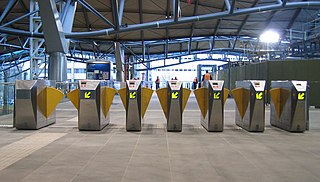
An automated fare collection (AFC) system is the collection of components that automate the ticketing system of a public transportation network – an automated version of manual fare collection. An AFC system is usually the basis for integrated ticketing.
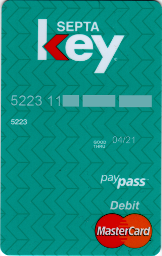
The SEPTA Key card is a smart card that is used for automated fare collection on the SEPTA public transportation network in the Philadelphia metropolitan area. It can be used throughout SEPTA's transit system, including buses and SEPTA Metro, and on Regional Rail.













